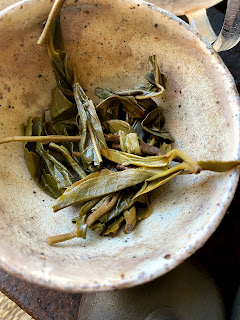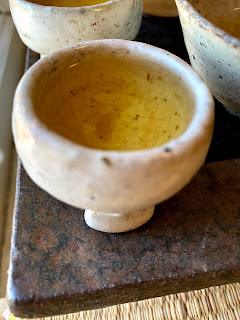This was the very first of Marco’s blind samples that I tired. It is decently hot here in the summers and I
felt like a drier stored, maybe younger Gushu type of tea this morning that
would give me a bit of energy and focus.
This one looked like it could be just that…
Dry leaves are moderate compressed leaves smell of a very
faint floral and grains and almost licorice type aroma. After rise the wet leaves smell of mild candy
and licorice and hay. The dry leaf looks
dry stored and somewhere between young and semi-aged.
First infusion has a honey sweet onset with a vacuous grains
base with a faint slow emerging lingering candy on the breath over a soft
mouthfeeling. The candy breath is very
long and smooth and mingles with a slight cooling on the breath. A sticky honey taste is found on the tongue.
The second infusion has a grains candy sweet onset that
slowly stretches into a long and smooth candy finish on the breath. The long and very smooth sweet aftertaste is
very very nice and is the feature of this puerh. There is some honey taste that returns in the
mouth and throat minutes later. This is
obvious single estate, simple and quite elegant. The mouthfeel is quite soft and the
throatfeeling is deep but faint. This is
a nice puerh. Even 10 minutes later this
is a long elegant distinct honey and candy bubble gum.
The third infusion has a more forest woody grains candy
onset. There is a bit of a rubbery blank
almost licorice mid taste then a long candy breath taste with minutes long
returning honey. The long pure candy and
honey sweetness is what makes this puerh quite elegant and beautiful. The Qi is very mild and quieting in the body
and mild. There is a mild mind slowness
and brow softness to the qi. (third infusion pictured).
The fourth infusion has a honey licorice grains woody onset
with a rubbery woody mid-taste which leads into a long pure candy taste on the
breath. The returning honey on the
breath comes minutes later then the distinct pure and strong candy is left on
the breath riding out for minutes there.
There is almost no astringency (which just very mildly appeared in this
fourth infusion) and no bitterness in this single estate puerh. The mouthfeeling is quite soft and slightly
sticky now. The throatfeel is vacuous
but mid-deep. There is honey on the
tongue afterward and candy on the breath.
The Qi is very comfortable in the body and mind. This has the taste and feeling of Lincang/Mengku
puerh to me. The sweet profile, slight
licorice, slight astringency, honey taste.
The strong candy and slight woody finish remind me of something more
Yiwu, maybe Autumnal Yiwu or Spring Lincang… probably Lincang spring puerh.
The fifth infusion has a deeper woods, honey, grains and
licorice onset. There is more of a
pronounced coolness in the throat a faint astringency. The sweetness is a layered honey taste on the
more substantial tongue coating. I can
feel a bit of tingling on the face and cheeks.
A mild and comforting Qi emanates from this puerh. This infusion really tastes like Northern
puerh. Deep honeys come out of a strong
stickier mouthfeeling and more substantial astringency in the throat. There is a mild camphor taste in the
throat. This infusion has a bit of power
to it has the astringency and tongue presence is felt. You can feel some of that astringency in an
empty stomach.
The sixth infusion has a woody, mushroom, licorice sweetness
to it initially in a full feeling sticky and somewhat astringent
mouthcoating. The moderate astringency
simulates the upper throat. There is a
long honey taste that lingers in the aftertaste and some candy is found in the
breath. This last few infusions have a
bit more power to them which is a shift from the very elegant 1-4th
infusions to a more tangible and powerful mid-session. The Qi is starting to have a mild stoning
effect on the mild.
The seventh infusion has an almost soapy, mushroom, woody,
less licorice taste. There is a bit of mineral
and stone tastes mid-profile and is a faint long candy finish. The astringency is less here and the candy
aftertaste is more. There is less honey
and more candy in this infusion.
The eighth infusion has a soapy woody mushroom faint
licorice initial taste with a long candy breath. The mouthfeeling is a touch astringent and
makes the tongue sticky. There is a
slight bland paper taste with candy in the aftertaste. The qi has a mild-moderate heaviness to it and
feels very mildly stoned in the body.
This is a common Mengku Qi sensation.
The ninth infusion has a flat woody almost mushroom onset
with a nice candy finish. The profile is
thinning out here but the astringency is keeping things real and the aftertaste
of candy long in the throat.
The tenth has a mushroom and almond like sweetness to
it. The mouthfeel is a sticky almost
drying but more astringent feeling.
There is still long candy in the breath with a faint woody taste and a
stoned Qi sensation. There is a slight
heart racing and alerting feeling now too.
The 11th infusion has a blank wood onset with
faint suggestions of licorice and chicory.
The candy aftertaste is dropping out leaving mainly woody taste over a
slightly drying astringent sticky mouthfeel.
12th infusion is a licorice bland paper and woody
onset with some candy and still a bit of camphor appearing in the breath. Heavy brow Qi feeling. Despite the initial and mid flavor profile
dropping out there is still a long candy finish even minutes later. Sticky astringent mouthfeeling.
13th has a paper tasting bland onset with a faint
candy finish in an active and astringent mouthfeeling. The 14th is much the same and I
put this into a mug infusion… With a bit of astringency this puerh is not a
great candidate to pushing hard here at the end so I end my session still on
flash steepings then to a mug…
The long grandpa mug is a bit fruity almost but still quite bitter/astringent
with a pucker astringent mouthfeeling and a bit of candy at the end…
The stamina of this one is a bit poor but the progression of
flavor, mouthfeeling, and Qi over the shorter session is somewhat dynamic and
changing. It is elegant for the first 4
infusions with a beautiful very long and accentuated candy and honey
sweetness. This tea is all about the
long elegant aftertastes here which is quite beautiful. The honey and candy take turns at revealing
themselves in the aftertaste for a long time which is the highlight of this
puerh and makes it of nice quality. The
mid profile becomes more astringent but also mushroom and woody and licorice
typical of the Mengku/Lincang producing areas with a familiar Mengku stoned qi sensation.
In the end of session you still get the candy finish on some level and the Qi
takes a turn to become more stimulating.
In the end I left quite energized from this session!
Guess: A pretty dry stored high quality Menkgu/lincang
single estate like gushu approx. 3-7 years old.
Answer: 2015 Biyun Yao Lishan Gongcha from Teas We Like
PeaceAnswer: 2015 Biyun Yao Lishan Gongcha from Teas We Like




















